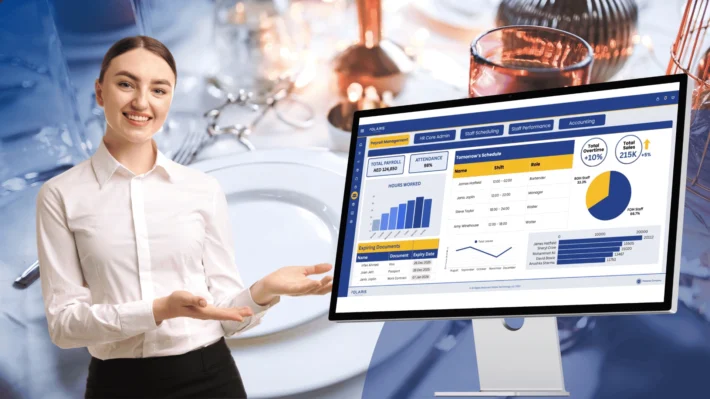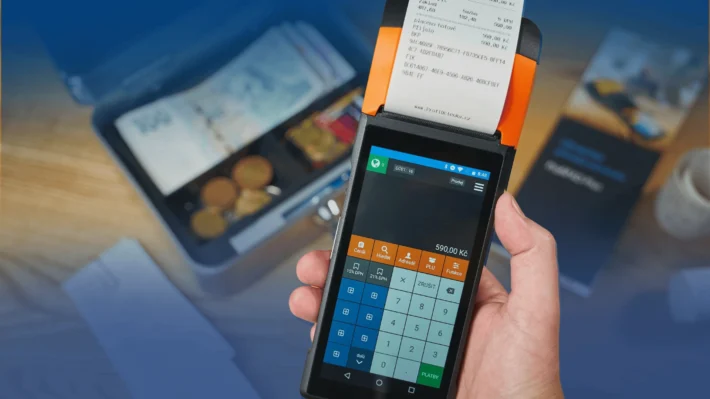From Guesswork to Smart Work: Organized Operations with Restaurant ERP Solution

Traditional manual management methods have long been the norm in the competitive world of restaurant operations. From handling inventory to scheduling staff and costing recipes, these processes are often labor-intensive and prone to human error. Restaurant managers have historically faced challenges such as inaccurate inventory tracking, inconsistent recipe costing, and inefficient staff scheduling. These issues not only impact profitability but also the overall customer experience.
Enter ERP (enterprise resource planning) software, a game-changer for restaurant efficiency in 2024. With advanced features tailored to the unique needs of the foodservice industry, ERP systems streamline operations, reduce waste, and provide valuable insights that drive business success.
How ERP Transforms Restaurant Operations
Streamlined Inventory Management
ERP systems have revolutionized restaurant inventory management by offering predictive analytics to forecast demand accurately.
By analyzing historical sales data and market trends, ERP software helps restaurants optimize their ordering processes, ensuring they have the right amount of stock at the right time. Real-time inventory tracking allows managers to monitor stock levels continuously, reducing the likelihood of overstocking or running out of critical ingredients.
One of the significant benefits of ERP in inventory management is the reduction of waste. Restaurants can minimize spoilage and overordering, crucial in a volatile market characterized by supply chain disruptions. A recent study found that ERP systems can help reduce food waste by up to 20%, significantly improving operational efficiency and sustainability.
Automating Recipe Costing and Menu Pricing
Recipe costing has traditionally been a manual and time-consuming process. With ERP, this task is automated, leveraging real-time ingredient data to calculate the exact cost of each dish. Using tools like AI-powered food cost calculators, his automation saves time and ensures accuracy, helping restaurants maintain consistent profit margins.
ERP systems enable dynamic menu pricing, adjusting prices based on ingredient costs and market trends. This digital menu flexibility allows restaurants to respond swiftly to price fluctuations, ensuring profitability. Data-driven menu optimization is another advantage, as ERP systems analyze sales data to identify high-performing dishes and suggest menu adjustments. A recent Deloitte study found that restaurants using ERP for menu optimization saw a 20% increase in profitability.
Staff Scheduling and Labor Cost Optimization
Creating efficient staff schedules is a complex task involving balancing labor costs and service quality. AI-based ERP systems can generate optimal schedules based on historical data, employee availability, and forecasted demand. This ensures that restaurants have the right number of staff during peak and off-peak hours, enhancing both customer service and cost efficiency.
Real-time data provided by ERP systems allows managers to make adjustments on the fly, further optimizing labor costs. Moreover, automated scheduling can lead to improved employee satisfaction, as staff members receive fair and balanced schedules.
Enhanced Food Safety and Compliance
Food safety is paramount in the restaurant industry, and ERP systems are crucial in maintaining high standards. These systems track ingredients from supplier to table, ensuring traceability and compliance with food safety regulations. Automated alerts for expiration dates and batch recalls help prevent the use of expired or contaminated ingredients, reducing the risk of foodborne illnesses.
By minimizing human error through automation, ERP systems enhance food safety protocols. Restaurants can ensure consistent adherence to regulatory standards, protecting their customers and reputation.
Data-Driven Decision-Making for Restaurant Success
Data-Driven Decision-Making for Restaurant Success
ERP systems provide a wealth of data that can be harnessed for strategic decision-making. Restaurants can gain actionable insights by analyzing various data points, such as sales trends, customer preferences, and operational metrics. These insights are invaluable for menu engineering, targeted marketing campaigns, and overall business strategy.
Restaurants need to use data analytics to learn more about how they run to make smart choices and grow their businesses. By monitoring key metrics and trends, restaurant owners can identify improvement opportunities and enhance their plans’ effectiveness. By making thorough reports on sales, expenses, and customer behavior, combining restaurant POS systems with enterprise resource planning (ERP) systems makes this even more useful. You can use this information to identify peak sales periods, monitor product levels, understand customer preferences, and assess the performance of various menu items. Restaurants can use these insights to make decisions based on data that will make them more efficient, cut costs, and make customers happier.
Accessing comprehensive data from the POS and ERP systems offers a significant competitive advantage, enabling restaurants to respond swiftly and strategically to market dynamics.

Challenges and Considerations for Implementing ERP in Restaurants
ERP Implementation for Restaurants
Implementing ERP in a restaurant setting comes with its challenges. From data migration to staff training and change management, careful planning is essential. A step-by-step guide to successful ERP implementation includes:
- Assessment and Planning: Evaluate the restaurant’s needs and select an ERP system that aligns with those requirements.
- Data Migration: Ensure accurate and complete transfer of existing data to the new system.
- Customization: Tailor the ERP system to the restaurant’s specific processes and workflows.
- Training: Provide comprehensive training to staff to ensure smooth adoption.
- Go-Live and Support: Launch the system and provide ongoing support to address any issues.
Example: Jollibee Foods
Jollibee Foods, a global fast-food giant, successfully implemented Oracle NetSuite ERP across its operations to support its rapid expansion. The ERP system helped Jollibee streamline its inventory management, procurement, and financial processes, enabling it to handle the complexities of operating in 33 countries with over 5,800 stores. This implementation reduced operational inefficiencies and supported Jollibee’s aggressive growth strategy.
Data Security and Integration Concerns
Data security is a critical concern when implementing ERP systems. Restaurants must ensure that sensitive information, such as customer data and financial records, is protected. Strategies for ensuring data security include:
- Encryption: Encrypting data both in transit and at rest to prevent unauthorized access.
- Access Controls: Implementing strict access controls limits data access to authorized personnel only.
- Compliance: Ensuring compliance with data protection regulations like GDPR or CCPA.
Seamless integration between existing systems and the new ERP is also crucial. Restaurants should work with experienced vendors to ensure smooth integration and avoid disruptions to operations.
Example: Starbucks
Starbucks faced significant challenges with its fragmented systems before implementing SAP ERP. By unifying its systems, Starbucks achieved complete visibility into operations, which improved data security and integration. This comprehensive approach enabled better compliance with food safety regulations and enhanced operational efficiency across over 32,000 stores globally.
Calculating the ROI of ERP for Restaurants
Calculating the Return on Investment (ROI) for ERP implementation involves considering both cost savings and revenue growth. Factors to consider include:
- Cost Savings: Reduction in food waste, labor costs, and compliance penalties.
- Revenue Growth: Increased profitability from optimized menu pricing and targeted marketing.
- Efficiency Gains: The time saved through the automation of manual processes.
Example: Bloomin’ Brands
A leading global fine and casual dining company, Bloomin’ Brands transitioned from legacy ERP technology to a cloud network service, achieving significant results. They saw a nearly 50% reduction in inventory and improved forecast accuracy, leading to substantial cost savings and operational efficiencies. This transformation demonstrated a clear ROI through enhanced supply chain management and reduced operational costs.

The Future of ERP in the Restaurant Industry
The Role of AI and Machine Learning
AI and ML are transforming ERP systems, making them smarter and more efficient. Potential applications include:
- Demand Forecasting: Using AI to predict customer demand accurately.
- Automated Tasks: Leveraging machine learning to automate routine tasks like inventory management.
- Personalized Marketing: Using AI to analyze customer data and create personalized marketing campaigns.
Emerging Technologies and Integrations
The integration of emerging technologies with ERP systems holds immense potential.
For instance, the Internet of Things (IoT) can collect real-time data from kitchen appliances and storage units, enhancing inventory management and food safety. IoT-enabled devices can track temperature, humidity, and inventory levels, automatically alerting staff to any deviations that could compromise food quality.
Additionally, artificial intelligence (AI) and machine learning (ML) algorithms can analyze vast amounts of data to predict customer preferences and optimize menu offerings.
Blockchain technology also presents opportunities for ensuring transparency and traceability in the supply chain, helping restaurants verify the origin and quality of their ingredients.
The Evolving Landscape of Restaurant Operations
As consumer preferences and industry trends evolve, ERP systems will help restaurants adapt. By continuously innovating and embracing technology, restaurants can stay ahead of the competition and ensure long-term success.
For instance, the rise of cloud-based ERP systems allows for greater flexibility and scalability, enabling restaurants to expand their operations without needing significant additional IT infrastructure.
Furthermore, integrating customer relationship management (CRM) tools within ERP systems can provide a more personalized dining experience, leveraging data to tailor marketing campaigns and loyalty programs.
As sustainability becomes increasingly important to consumers, ERP systems can help restaurants track their environmental impact and implement greener practices, such as reducing food waste and optimizing energy usage.
Conclusion
ERP software will continue revolutionizing restaurant operations in 2024 by streamlining processes, reducing waste, and providing actionable insights. Automation and data-driven decision-making are key benefits, enhancing efficiency and profitability. As the industry evolves, ERP systems will play a pivotal role in helping restaurants navigate challenges and seize growth opportunities. Embracing innovation and technology is essential for a thriving restaurant industry, now and in the future.
Contact Us & Book A Demo
One comment
Comments are closed.




[…] Restaurant ERP Organized Operations with Restaurant ERP […]